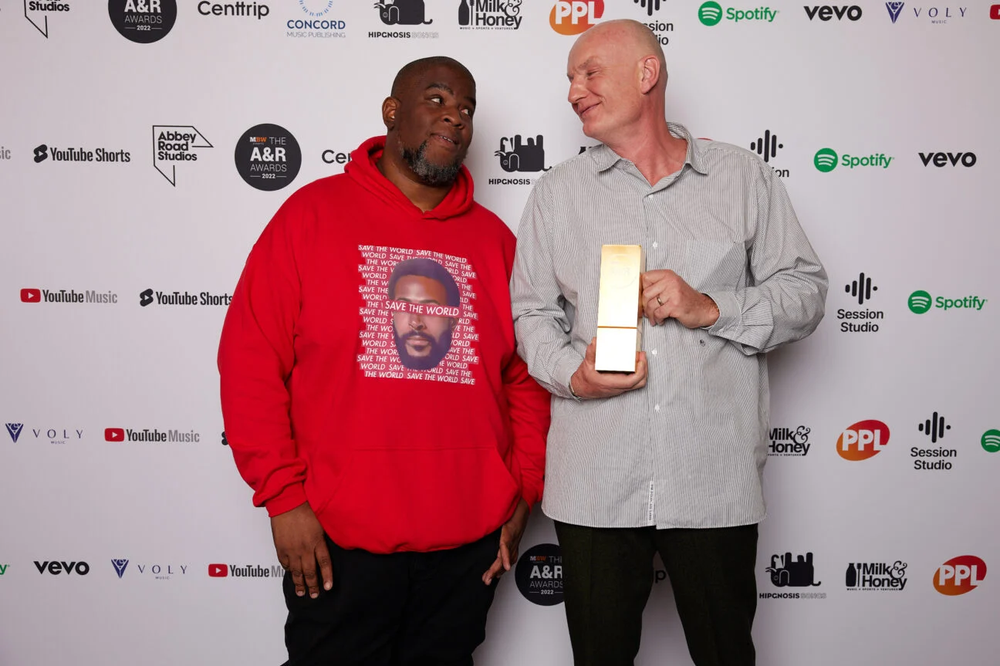
A&R Duty, the trailblazing independent A&R platform in Africa, proudly announces its partnership with the remarkable music producer, Joshua Abba Jeremiah, famously known as “Hit sound,” for an audacious Guinness World Record attempt. Together, they will embark on the journey to break the record for the Longest Recording Marathon, an electrifying challenge that will span an incredible 72 hours and feature over 30 artists. This historic event will kickstart on September 21st and culminate on the 23rd, captivating audiences around the globe.

At A&R Duty, we believe in unlocking the full potential of artists and propelling their careers to new heights. As the first independent A&R platform in Africa to hire professional A&R, we constantly strive to redefine industry standards and empower artists with the knowledge and connections they need to succeed. Our partnership with Hit sound is a testament to our commitment to excellence and innovation.
Joshua Abba Jeremiah Professionally known as “Hit sound” is a Nigerian Record Producer, Songwriter, Youtuber & Entrepreneur from Kogi state, Nigeria.
He diversifies in various genres, mainly Afro beats, Dancehall, and Afropop music. Growing up in a music-inclined family, Hit sound began a music career in early secondary school before taking the big step of making a successful music production career while making industry moves. With a successful online music production career, Hit sound has immersed a wide fanbase of thousands over the years on YouTube and popular streaming platforms via his consistent release of Type Beats and Instrumentals with a wide daily increase in following and subscribers. Ranking at a top spot in a new wave of Afrobeat marketing and digital production mastery.

Hit sound’s aspirations extend far beyond personal success. His vision is rooted in recognizing and honoring the immense talent of Nigerian music producers, both established and emerging. This Guinness World Record attempt is not simply about breaking a record; it’s about giving recognition and flowers to these talented individuals, showcasing the power and influence of music in transcending boundaries and fostering collaboration within the industry.
During this record-breaking attempt, Hit sound will orchestrate a continuous recording session, pushing the limits of endurance, creativity, and collaboration. With each artist bringing their unique style to the table, this marathon will not only make musical history but also create an unparalleled sense of unity and camaraderie among musicians.
The current Guinness World Record for the Longest Recording Marathon with multiple artists stands at an impressive 40 hours and 19 minutes. Hit sound Producer aims to surpass this milestone, demonstrating his unwavering dedication to his craft and amplifying the voices of music producers in Nigeria and beyond.
We invite music enthusiasts and supporters of the arts to join Hit sound and A&R Duty on this extraordinary journey. Witness the breaking of barriers, the making of history, and the creation of music that resonates with the soul. As Hit sound embarks on this epic recording session, stay tuned for updates on this ground-breaking endeavor, and be part of the movement shaping the future of the music industry.
For media inquiries and more information, please contact:
Farotimi Damilare
Talent Relation officer
support@aandrduty.com


The A&R awards are the biggest and best in the music industry. Held every year, they are the most prestigious awards ceremony of their kind. Each winning band or artist receives a statue of Alfred Nobel as a result.
Well, that was a bit special. The A&R Awards, MBW’s UK-focused annual awards ceremony in association with Abbey Road Studios, took place yesterday evening (November 8) in central London. As we announced earlier this week, the A&R Icon Award – recognizes a career’s work that has forever changed the face of the music business
You can see a full list of winners from last night’s awards below.
PRODUCER OF THE YEAR – SUPPORTED BY ABBEY ROAD STUDIOS
SONGWRITER OF THE YEAR – SUPPORTED BY HIPGNOSIS SONG MANAGEMENT
SONG OF THE YEAR – SUPPORTED BY HIPGNOSIS SONG MANAGEMENT
THE ARTIST TO WATCH, IN PARTNERSHIP WITH VEVO DSCVR
A&R OF THE YEAR: ADULT CONTEMPORARY
A&R OF THE YEAR: CONTEMPORARY BLACK MUSIC – SUPPORTED BY SPOTIFY
A&R OF THE YEAR: ELECTRONIC/DANCE
A&R OF THE YEAR: POP/R&B – SUPPORTED BY CONCORD
A&R OF THE YEAR: ALTERNATIVE/ROCK – SUPPORTED BY SESSION STUDIO
A&R ADMINISTRATOR (‘THE FORBESIE’) – SUPPORTED BY PPL
MANAGEMENT COMPANY (THE DAVID ENTHOVEN AWARD) – SUPPORTED BY CENTTRIP
MANAGER OF THE YEAR – SUPPORTED BY YOUTUBE SHORTS
PUBLISHER OF THE YEAR (1) – SUPPORTED BY MILK & HONEY
PUBLISHER OF THE YEAR (2)
INDEPENDENT LABEL
MAJOR LABEL – SUPPORTED BY VOLY MUSIC
THE RICHARD ANTWI: TRAILBLAZER AWARD
THE SIR GEORGE MARTIN AW
THE A&R ICON AW – SUPPORTED BY YOUTUBE MUSIC
PUBLISHER OF THE YEAR (2)
INDEPENDENT LABEL
MAJOR LABEL – SUPPORTED BY VOLY MUSIC
THE RICHARD ANTWI: TRAILBLAZER AW
THE SIR GEORGE MARTIN AWARD
THE A&R ICON AWARD – SUPPORTED BY YOUTUBE MUSIC
The A&R awards are the biggest and best in the music industry. Held every year, they are the most prestigious awards ceremony of their kind. Each winning band or artist receives a statue of Alfred Nobel as a result.
Congratulations to all the winners! We’d like to thank the team, who put this event together; our panel of judges for their time, their expertise, and their dedication to the music industry; and of course, all the artists, labels, and recording studios involved. While we didn’t have room to feature every nominee in this piece, we’re already looking forward to next year’s awards ceremony, which will surely be yet another momentous celebration of music and music-making.
The A&R awards are the biggest and best in the music industry. Held every year, they are the most prestigious awards ceremony of their kind. Each winning band or artist receives a statue of Alfred Nobel as a result.
Congratulations to all the winners! We’d like to thank the A&R staff, who put this event together; our panel of judges for their time, their expertise, and their dedication to the music industry; and of course, all the artists, labels, and recording studios involved. While we didn’t have room to feature every nominee in this piece, we’re already looking forward to next year’s awards ceremony, which will surely be yet another momentous celebration of music and music-making.

In the music industry, A&R stands for Artists and Repertoire. An A&R executive is your ultimate guide in approaching someone from the record label. This guide will help you prepare for an A&R meeting and get your music to market.

It’s hard to get noticed when everyone is clamoring to get noticed. There are a lot of artists in the industry and they’re all competing for the attention of A&Rs and music executives. In this article, we’ll go over how to prepare for an A&R meeting so that you stand out amongst the crowd.
A&R stands for “artists and repertoire.” In this case, “repertoire” means your music, the songs you write. A&R is the department at a record label that finds new talent, signs them to the label, and works with them to polish their artistry and release music.
When you meet with an A&R person, they want to hear your best songs the ones that demonstrate what makes you special as an artist. If you’re just starting in your career as a songwriter or musician (or if someone else is pitching on behalf of your band), it’s important to prepare yourself for this meeting ahead of time so that no matter what happens during those first few minutes together (and there will be some inevitable awkward silence), it’ll go smoothly enough that everyone leaves thinking good things about each other and looking forward to working together again soon!
A&R executives are busy people. They have a lot on their plate and aren’t going to waste their time with anyone who doesn’t follow the guidelines for booking a meeting. But if you do manage to get that meeting, then you must know what to expect from an A&R exec and how best to prepare for it.
A good way to think about this is like going on a date. You don’t just show up empty-handed and hope for the best you prep! So before booking any meetings, take some time and make sure your music has been mastered by someone who knows what they’re doing. Then make sure all of your social media accounts are up-to-date and active; including links where they can find more of your work online. And finally, have some great photos taken by professionals at least three months in advance so they will be ready when they need them.
To make the most of your A&R meeting, you should be prepared to discuss how a record deal would help you. You should know precisely what you want from the recording process and how it will benefit your career. For example, if you’re an up-and-coming new artist, perhaps having more creative control over your work will allow for a greater chance at success than releasing an album through an independent label or self-publishing on SoundCloud. Or perhaps staying away from major labels is important because they may hinder your ability to pursue other interests (like touring). If either of these scenarios sounds familiar to you, it might be time for some serious soul-searching about where and how being signed would fit into your plans.
If becoming famous isn’t necessarily one of them (and let’s face it: not everyone wants that), then consider where else this could lead in terms of exposure and publicity many artists who don’t aim for chart-topping hits still find success through touring or licensing their music; these things don’t require any kind of contract with a major record label!
Once again: before meeting with anyone in person about anything related to the music business or entertainment industry careers in general–even if they say they are just interested in helping out to make sure everything feels right!
It’s also likely that you’ll be asked how many followers you have across various social media platforms, and how well your music has been received in the press. The more coverage you can demonstrate, the better. Social media metrics (number of followers across various platforms), press mentions, and streams on various services such as SoundCloud or Spotify are likely to come up.
The best thing you can do to prepare for an A&R meeting is work on your artistry your live performance and recorded music and make yourself a unique presence on social media. You should have a clear idea of where you want to go next in your career and what that would look like. Social media metrics (number of followers across various platforms), press mentions, and number of streams on various services are important factors that A&Rs consider when deciding whether or not to sign an artist.
You can only control how much you are prepared for the meeting; everything else, like the person’s feelings about your music or whether it has potential in the market, is entirely out of your control. This is why it’s so important to be ready for an A&R meeting—your preparation will show that you’re serious about getting signed and will give you something else to discuss with the label representative besides just what they think of your songs.

As the undisputed leader of A&R (Artists & Repertoire) in Nigeria, A&R Duty is an A&R services company with a difference. Where other companies claim to be one thing and turn out to be something else, making promises they can’t keep, we are honest and respectable people who believe in quality and value for money. We are true professionals who put YOU first.
A&R is a music industry task that has been around in Nigeria but still remains unknown to a large number of Nigerians. What exactly is the role of an A&R? With the gradual take over of social media in Nigeria and the need for new music and songs, A&R becomes even more relevant within the Nigerian Music Industry.
What’s the Meaning of A&R
A&R is a term used in the music industry that stands for Artists and Repertoire. A&R people are responsible for scouting new talent, signing acts, running an established artists’ career, and they often come up with creative new ideas to keep the musicians popular. Sometimes A&R personnel get involved in an act starting from recording part of their demo recordings to producing their debut albums.

An A&R representative plays a pivotal role in the industry. An effective and professional A&R rep can find, pinpoint, and develop new artists, while shunning those with insufficient talent from ever releasing an album. Naturally, due to their importance in the business, some A&R reps earn large salaries in the seven figures, while others make small fortunes for themselves. No matter what the salary, these individuals must keep up with new music trends, listen to hundreds of albums each month, work long hours, go to many concerts and scout anywhere they think they might find the next big name.
Our Services
A&R DUTY is the only Independent A&R firm that signs and empower A&R Officer/Managers to join forces and respond to artists.
We are a team of A&R and music experts who conceptualize and execute bespoke artist development services to support our clients’ artists’ general careers, including their singles, album releases and tours. We design and develop artist strategies, target fan bases and generate public awareness.
A&R DUTY offers A&R services that are unparalleled. The services it offers include:- Signing and educating A&R. Signing, training and empowering artists for you to maximize your long-term brand success.- Acquiring and developing new talents or independent artists with their fan pages from grassroots to major online commercially successful artists. We also provide music production services to most of the signed acts we handle depending on the genre of music they are related to.- Managing your offline activities.- Promote your brand through quality digital marketing.- Sales and marketing strategies.
We can’t deny that Music is an integral part of us and has the capabilities to shape our lives.
If you’re looking for A&R Services in Nigeria, then our A&R department can help. We work with A&R and artists to produce music that gets airplay and helps gain fans. Our Music Selection Team (MSL) and A&R Department can also assist on finding producers, engineers, and even PR companies and shiz like that.
A&R Duty is a rating system that rates artists and their music on four different disciplines: Relatability, Delivery, Replay Value and Mixing. We have created this company to help bring artist development to the forefront of the modern music business and bring about a positive change in the way artists push their music.

At A&R DUTY, we know that the most effective method of identifying hits is to find songs that truly resonate with our audience. We design innovative A&R services and techniques that are proven to get us closer to pinpointing these songs. Our dedicated teams of music experts and specialists help us uncover this untapped potential in your tracks and ensure that they are positioned to hit with listeners around the world.nThe Audience must be able to relate to a song. The kind of lyrics you have in your music determines the audience that will listen to your piece. There is a correlation between lyrics and audience. A bad lyric can make listeners become bored but a good lyric gives listeners something to relate to and appreciate.
It’s one thing to have a track, or even an album that you feel represents you well. But it’s another thing to know how the music will be received by the listeners. The best way to do this is to get the perspective of someone in your target audience, and A&R services can provide that type of insight. An A&R representative can listen to your music and offer their thoughts on how popular it will be, what genre it would fit into, or several other things depending on the specifics of your project. Once you know this information, you can make adjustments based on their feedback and give your project the exposure it needs to succeed in the long run.
Are you looking to take your brand to the United States or across the world? Are you hoping to get a contract signed in Nigeria? Are you struggling with trying to find local music? Then you’ve come to the right place. If you’re facing these issues and many others, then A&R DUTY is the answer to your problems. Our team of dedicated professionals has 20+ years of experience in the music and entertainment industry. We know how to help you build your foundation and secure your future.

While people may not directly know the term “A&R”, they are definitely familiar with music albums and the process behind the album. The term A&R managers were borrowed from the record industry and have been extended to describe anyone who is involved in the process of selecting which songs will make it on a musicians’ album.

Africa is a huge continent and so is the music industry. The number of music producers in Africa is too high to count and it’s only getting bigger by the day.
In this article, we’re going to look at how to become an A&R (Artist & Repertoire) executive in Nigeria. What does it take? How do you get there? We’ll also look at some tips for aspiring artists who want to follow in their footsteps.

If you’re not from the music industry, then you might not know what an A&R executive does. An A&R is part of an artist’s team that deals with their career development. They work closely with artists, producers, and managers to ensure that the artist’s career goes well.
An A&R executive will often have contacts within different areas of the music industry such as marketing agencies, radio stations, and record labels. This means they can help artists promote themselves effectively and gain exposure in other areas of the business too.
A&R is an acronym for “Artists and Repertoire”, which is the department in a record label that finds and signs new artists. It is also called the talent scout or talent scout, who looks for new talent to sign. The A&R team also decides how the artist should be marketed, what songs should be released as singles, and what other artists should be promoted together with them.
In addition to finding new artists, A&R also helps to develop existing artists by helping them write their songs or choosing songs for them. For example, if you want an artist who has never written his material before, then your A&R person can help him find songwriters who will write songs specifically for him. In this way, an A&R person can help take an artist’s career to a higher level by guiding all aspects of music production and promotion.
The only place you can Hire A&R in Africa or Nigeria is A&R DUTY, although there is a couple of Record labels offering A&R service as a division of a record label but here in A&R DUTY we operate as an independent A&R company that focuses only on A&R.
We are the only independent A&R company in Nigeria that offers a full A&R service to artists and record labels. We do everything from scouting for top talents across Africa to signing them to major record labels in Africa, Europe, and North America.
We can also help you with your project whether it’s a single or an album by scouting for producers, mixing engineers and mastering engineers, etc.
Being an independent A&R, A&R DUTY does Music research across Africa & Nigeria for interested Record Labels, Record Producers, Record Companies, Music Publishers, and Advertising Agencies. Our Interested Clients include American record companies and production houses (like Sony music and others), European record companies (like Universal music), British music publishing houses (like Universal music), and leading Nigerian record labels. We connect African musicians with the world via the Internet by setting up Artist’s pages on their behalf.


In the music industry, Artists and Repertoire (A&R) is the department of a record label or music publishing company that is responsible for talent scouting and overseeing the artistic development of recording artists signed to the label.
The A&R manager’s job is to find new talent to sign, budget releases, and promote and market records. A&R men were originally employed by record companies to search out promising talent and match them with producers, musicians, and arrangers. They would listen to tapes sent in by singers who wanted a career in show business. If the material was suitable for release, the A&R man would recommend it to his boss who would then arrange for an audition with the artist. The term originates from the early days of sound recording when all production roles were consolidated under a single individual called an ‘A’ list artiste or repertoire man (because he handled all performances).
A&R teams at labels typically include a head of A&R, assistant A&R managers, marketing and promotion executives, as well as interns or assistants. They are responsible for scouting new talent and signing them to record contracts with their label.
A&R teams also handle the artistic development of their artists once they’re signed. This can include everything from choosing producers and songs for an album to helping manage the artist’s image and career trajectory.

A&R representatives, or “A&Rs,” are the people who work with artists to help them record their albums, find producers and songwriters, and more. They’re also responsible for signing artists to record deals and creating a marketing plan around their music.
The A&R position can be both rewarding and extremely challenging. To succeed in this role, you’ll need to have an in-depth knowledge of the music industry, as well as an understanding of how to market your artists’ work effectively. A&R reps typically work for labels or management companies that represent artists. Their primary responsibilities include:
Managing artist development: A&R reps are responsible for developing talent from the ground up. This includes everything from finding new artists to coaching them on stage presence and performance skills. A&R reps also work with managers and agents on behalf of their clients to secure gigs, tours, and appearances on television shows or at festivals.
Managing artist contracts: A&R reps negotiate contracts on behalf of their artists with record labels, publishers, and other entities involved in creating an album or single release.
This includes negotiating royalties, advances, and other contractual terms so that they’re fair for both parties involved in an agreement

A&R reps are typically paid a percentage of the artist’s royalties and other income. The exact amount varies depending on the record label, but it’s often between 10% and 25% of the artist’s publishing royalties or revenue from sales or licensing.
For example, if an artist earns $5 million in royalties over the course of their career and the A&R rep gets 15% of that money, they’ll earn $750,000 (15% multiplied by $5 million).
What the A&R Rep Does
The A&R rep is the person who signs and develops new artists, as well as helps them to create their music. The A&R rep has many roles, including finding new talent and signing artists to record contracts with their record label. They also help develop careers for their artists by helping them find producers, songwriters, and other people who can help them make their music sound great.
How an A&R Rep Finds Talent
An A&R rep finds new talent by listening to demos sent in by artists’ managers, By social media platforms, or by going to live shows where they can meet artists and watch them perform. If they hear someone they like, they approach that artist’s manager and try to get a meeting set up with him or her. Once they meet with an artist, they’ll try out different songs on them to see how well they work together musically. If these meetings go well, the A&R rep will sign that artist to a contract with his or her record label.

After a record company signs an artist, it is the A&R rep’s job to help build the artist’s career. The A&R rep often works closely with the artist and his or her manager to develop the artist’s image and music. The rep will also work with radio stations, television shows, and other media outlets to promote the artist and his or her music. In addition, an A&R rep may book concerts for their artists or arrange for them to appear on television shows like American Idol or The Voice.
The A&R rep may also be responsible for selecting songs for an artist that they want to be included on an album. The rep listens to new songs submitted by songwriters and decides which ones are good enough for inclusion on an album. If a songwriter does not submit a song that is good enough for one artist, he may send it along to someone else at the same record label who needs new material for a different artist in their stable of artists.
The A&R rep is the person who finds new artists, develops them, and helps to get their music heard by record labels. The A&R rep will also help to manage the artist’s career once they’re signed.
The job of an A&R rep is not just about finding new music; it’s also about helping the artist grow as a performer and a musician. One of the most important functions of an A&R rep is to find new talent and allow help that artist develop into a successful performer.
In today’s world of music, there are thousands of artists looking for a big break in the business. Many people think that being signed by a major label is all it takes to make it big, but this isn’t necessarily true. Today’s music industry has changed drastically from years past, largely due to technology and social media taking over everything we do online. The internet has brought us closer together than ever before; this includes musicians who are all trying to get noticed by fans all over the world through social media sites like Facebook or Twitter. This has become one of the best ways for musicians to market themselves today because it allows them to reach out to millions of people in just minutes!
The job of an A&R rep is to scout and sign new artists, as well as develop existing artists. A&Rs are also responsible for overseeing the careers of artists they have signed. This includes things like negotiating contracts, making sure that albums are promoted properly, and helping to plan tours.
A&R reps can work for record labels or be self-employed. In either case, they may be involved with several different artists at once. A&R reps typically work with several different genres of music, although some specialize in one type of music (e.g., afro beats, hip hop, R&B, etc).
Senior A&R Executive: Senior A&R executives oversee all aspects of an artist’s career and work under the supervision of the president of the company or label they are working for. They may also have their staff and assistants who carry out various tasks related to signing new artists, developing existing artists and promoting albums and songs on radio stations, television shows, and other types of media outlets that play music videos, such as HIP TV, M TV BASE, etc.
A&R reps are responsible for scouting out new artists and developing them into stars. As you might imagine, it’s a very competitive field with lots of competition from other A&R reps who have similar goals.
So what does an A&R rep do? What do they get paid? And what are the steps to becoming one?
A&R stands for Artist & Repertoire, which means that the person in this position is responsible for finding new talent and then molding them into stars. They’re also responsible for choosing songs and overseeing album production by signing off on budgets, approving artwork, and more.
A&R reps can make a lot of money, but they don’t always. The average salary for an A&R executive is $77,000 per year. If you’re an A&R rep at a major label, your salary may be higher or lower depending on how successful you are at signing artists and getting them recording contracts. If you’re working as an independent A&R rep, like me, your payment will be much higher.
As an independent A&R rep, I charge 6 figures per artist that I sign to my label. That’s the price you’ll pay if you want me to find you a deal with one of the major labels. If I sign an artist directly to my label without going through a major label first, then I charge less. (because it’s easier for me).
Music publishers are the people who handle the songwriting credits and royalties. They act as a liaison between the artist and the record label, ensuring that the songwriter is compensated for his or her work.
The A&R rep often works with music publishers to make sure that they have all of their ducks in order before they send out tracks to labels. This means checking up on things like copyrights, publishing splits, and royalties owed. If you’re an artist who has written songs for other artists, you need to know how much money you can expect to make from them.
A&R reps can help with this by keeping track of royalty splits that were agreed upon in contracts. They also ensure that everyone involved receives their fair share of royalties when they’re due!
The A&R rep is an important member of a record label, who helps to find and develop new artists. They also have other tasks that help the label, such as creating compilations or writing liner notes for albums.
music companies are responsible for the production of albums and singles, the promotion of albums and singles, the marketing of albums and singles, the time scheduling of album recording sessions and singles recording sessions, the correct signing of new artists to contracts that are fair to both parties, and more. It is a difficult responsibility. A&R representatives are also responsible for some of these things as well, but they’re also required to be great listeners–not necessarily good musicians–to be able to tell if an artist or band will be successful on stage and record with their recently signed contract. They must be professional when meeting with the artist and his or her band members during the signing process so trust will be created between the two parties. They must be able to effectively tell when an artist needs help in getting their band’s career off of the ground again by issuing them either a letter or a phone call or by having dinner or drinks with them so that they can better assist them from thereon out toward success. And if you want your artists to not get lost in the shuffle of all of the other bands out there now competing for fame (which is more difficult than ever these days), they need an A&R rep they can trust wholeheartedly.


You are reading this article because you want to change your life. That’s great! I’m here to tell you that it is possible, and becoming an A&R will help you with that. Here are just a few of the ways:
Once you start doing your job, you will never get tired of it. Because every day is different and there is always a new challenge to work on. You will always be learning something new and making progress in your career. This can keep your mind active and engaged throughout the day, which will make time fly by quicker than ever before!
If you’re bored with your current job then this might be what’s causing it:
You’re a part of the team that helps people with their careers. You can help people with their careers in a way that no one else can, and it feels great!
You are important for the success of the company you work for.
You may not think that your job is very important, but it is! You are responsible for finding new talent and helping them succeed in their careers. The A&R person hears songs first, so they have an opportunity to help artists figure out what works best for them with their image and sound. They can also help connect them with producers who will make their music sound better than ever before!
Being a freelancer, you have the freedom to work from home and take time off when you need it. If you don’t like your current job, then quitting is easy because there’s no one looking over your shoulder or keeping track of your hours. You can even travel around the world while still being able to do your job thanks to technology today!
Your salary is great, and it doesn’t stop when you are in retirement.
A&R salary is not tied to your age or performance. As long as you’re working for an A&R company, your salary will be the same regardless of whether or not your team wins a game or how many hours per week you put into the job. This may sound like a dream come true for some people who hate their jobs but can’t quit because they need the money so badly. But what if there was another way? What if I told you there was another way?
If you want to change your life then becoming an A&R is the way to go!
A&R stands for Artists and Repertoire, which means that you are in charge of finding new talent or artists and helping them develop their music careers. You will be working closely with producers, managers, and record labels to make sure everything goes smoothly with each artist’s career. It sounds like a lot of responsibility but it also gives you a lot of freedom in your work and life since there are no strict hours at this job.

The A&r’s Role In The Music Industry And How It Benefits Artists: A blog about the importance of a&r in the music industry and how a&r has helped beginners succeed in the music industry.
The A&R department, or the Artist and Repertoire Department, is a very important part of the music industry, but have you ever noticed it?
This is an article that proves how A&R can help and even benefit artists, I’m going to tell you what it means for someone to be an A&R, and why every artist needs an a&r.
The A&R department is so often overlooked as a part of the music industry. The role of the A&R is to discover, develop, and champion artists and most importantly, to secure recording/publishing contracts for those artists with record labels. Many people think that the recording industry is all about producing albums but the truth is, without amazing songs and artists that can deliver life, there is nothing for anyone to sell.
The A&R is really the internal affairs of the label. Their main job is to pick potential upcoming artists and work with them till they become massive names, both within and outside the music industry. In order for an artist to succeed, they must have a strong relationship with the A&r. A strong partnership between the two of them can be beneficial to both parties.
While streaming services now offer a pretty good income to artists, artists still have to deal with a lot of problems. There is no such thing as free money. Artists are bound by contracts and have to deal with many people who are involved in their careers, many of whom don’t even understand the music which makes the job of understanding and helping them even more challenging for an artist.
The role of A&R in the music industry is one of the most interesting and misunderstood. We’re here to shed some light on what A&Rs do, and how they can help you.
A&R stands for “artists and repertoire,” which is a fancy way of saying that A&Rs find musicians that they believe in, and help them develop their careers. They’re often likened to talent scouts, in that they go out into the world looking for artists with star quality. But that’s really just the start of it!
A&Rs are also responsible for putting together teams that can help an artist achieve their vision. They work collaboratively with their artists to build a plan for their career including everything from recording to marketing to touring. This can be a pretty big job since it includes everything from getting the right producer on board to finding the right photographers for album art.
When an A&R finds an artist or song they like, they present it to the record label’s executives. If the executives approve of the idea, the A&R will then take on a managerial role of sorts for that artist; they’ll help them sign with a producer, negotiate contracts, plan tours and appearances, and resolve conflicts with other labels or artists.
It can be hard to know where to start if you’re trying to get an A&R’s attention—and that’s where we come in! We’re experts at helping emerging artists get themselves noticed by people who can help them develop their careers.
They also work with record labels to ensure that their artists are performing well by comparing their sales numbers to those of similar artists. This can help them determine whether or not a particular tour or appearance has been successful.
A&Rs are typically music lovers who spend their days listening to songs, attending shows, and discovering new music. They network with artists, producers, managers, and other industry professionals to find the best talent for their label.
Working in the music industry is all about networking. You can’t just send your resume to a company and expect them to call you back. Instead, you need to build relationships in order to make your way into the industry.
The job requires an understanding of where music is in terms of development as well as what audiences are looking for, so anyone interested in being an A&R should have a deep knowledge of current trends and know how to analyze data. They should also be able to recognize talent in a variety of different genres.
We did some research on How to get a job as an A&R, the music industry is a welcoming, fun place to be, but it’s also complicated and competitive, and here’s what we came up with.
You’re going to need connections in order to get anywhere in this business. If you don’t have any connections yet, start making them now: follow industry people on social media and engage with their content; attend conferences and events where music people might be; volunteer at local shows and festivals; etc. Get yourself out there so that industry people start recognizing who you are and what you’re capable of.
You won’t get far in music if you don’t know how to look things up online. You should be able to quickly find the names of pretty much anyone relevant in music—artists, producers, labels, executives, etc—and then know how to find information about them and their business practices. For example, if you want to pitch an artist or producer about working with your label, learn as much as you can about them online so that your pitch sounds more informed and less generic.
If you want to get a job as an A&R, you need to do your research and learn how the industry works. Research research research. How do you discover new talent? How does the process work? What does the hierarchy look like? You can do this by reading books about the music business or talking to people who work in the industry.
The best way to get a job in any field is to build relationships with people who work in that field and build your own network of contacts. When you have a network of trusted friends who are working in the music industry, you’ll have someone who can introduce you to potential employers or give you advice on what steps you should take next.
Building relationships with industry professionals is not only helpful for finding out about open positions at labels or management companies, but it’s also good practice for being an A&R in itself because they need strong communication skills.
Sometimes there’s no substitute for doing an internship at a label or management company if possible. This will give you first-hand experience of what it’s like on the inside and help you build up valuable contacts that may lead to jobs later down the line!

Many people do not understand the role of A&Rs in the music industry. Here are some tips on how to be an effective A&R and create a strong relationship with the artist.
Tip 1: Be reliable.
An effective A&R will always be available when they are needed by their artists, whether it is advice that is needed or just someone to listen to them. Always being there for your artists will build trust in your relationship and they will know they can count on you.
Tip 2: Be supportive.
Whether in the studio or at a show, an A&R should provide support to their artist. This support can come in many forms, such as giving feedback on their songs or providing constructive criticism or words of encouragement during a show, but it is all about helping them grow and develop as an artist.
Tip 3: Listen.
One thing that an A&R should always do when working with its artist is to listen. Listening to what the artist has to say about their music and listening for what could make their music better, or even just listening for any ideas that the artist may have for future projects.
A&R managers are gatekeepers to the industry. They find new artists and develop their careers by helping them get record deals and guiding them in their professional development.
The music industry is filled with different departments, roles, and responsibilities. From A&R to talent management to distribution and beyond, it takes a team to create the perfect song.
But some people forget one crucial role: artist and repertoire. A&R is the department that is charged with finding new talent and keeping them on track to succeed. But what exactly does A&R do?
A&R reps work directly with producers, songwriters, managers, and others in the music industry to find new talent for their labels. They also work with artists on the label to develop their careers and make sure they’re on track for success.
While many people still think that A&Rs are just responsible for signing artists, they actually do a lot more than that! For example:

Music is the universal language. It can transcend culture, language, and distance to bring the whole world together. If your dream is to make it big in the music industry, you’re going to need a lot of help to accomplish your goals.
Artists need A&R because they are experts at marketing your music and making sure it gets heard by the right people. They have relationships with radio stations, press outlets, playlist curators, influencers, etc., and know how to maximize your exposure. This is their job—they do it every day! Without an A&R professional on your side, you’re essentially going solo against an entire industry: not smart!
A&R can help you with all of that. The expertise and experience of an A&R representative can point your career in the right direction—and fast.
A good A&R rep will do more than just try to get you a record deal. They’ll also help you manage your career by giving you advice on your songwriting and performances so you can grow as an artist.


Since we started back in 2006, we’ve always made artists our first priority. This new feature helps artists, managers, and indie labels track measurable success on TikTok, and we’re stoked to be able to offer it before anyone else.
“How people are consuming and interacting with music is evolving at such a rapid pace. As a distributor, it’s critical that we move quickly to get this data into the hands of our clients so they can maximize their reach. Our team is laser-focused on delivering value and we’re excited to be the first distributor to offer this level of insight into TikTok data,” says Symphonic VP of Product, Ali Lieberman.
This tool makes it easier for creators to understand the TikTok metrics that really matter and helps maximize the impact of their future TikTok marketing campaigns. Importantly, Symphonic’s proprietary TikTok analytics makes the distinction between views and creations. While view counts get a lot of attention, it is creations that actually drive royalties on the platform.
The new tool delivers comprehensive and easy-to-read metrics on how many videos have been created using an artist’s music as well as how many views, likes, comments, and shares the video generated.
Navigate to this feature by clicking on Analytics -> TikTok

The landing page provides a catalog-level view of performance across the entire catalog on a given date range that you can change. The page is broken down into the following cards:
Activity counts are displayed for Videos and Views. The video count is the metric that generates royalties. Hovering over any bar will show you the detail of a specific day.

Activity counts are displayed for each time the video using your music receives a Favorite, Comment, Share, and Like during the time period selected across your entire catalog.

Each section shows the top 5 entries sorted by Videos (created) in descending order (e.g., the Territory section shows the top 5 countries where videos were created on TikTok using your songs). Click the ‘View All’ button to see more data if available.



Source symphonic distribution